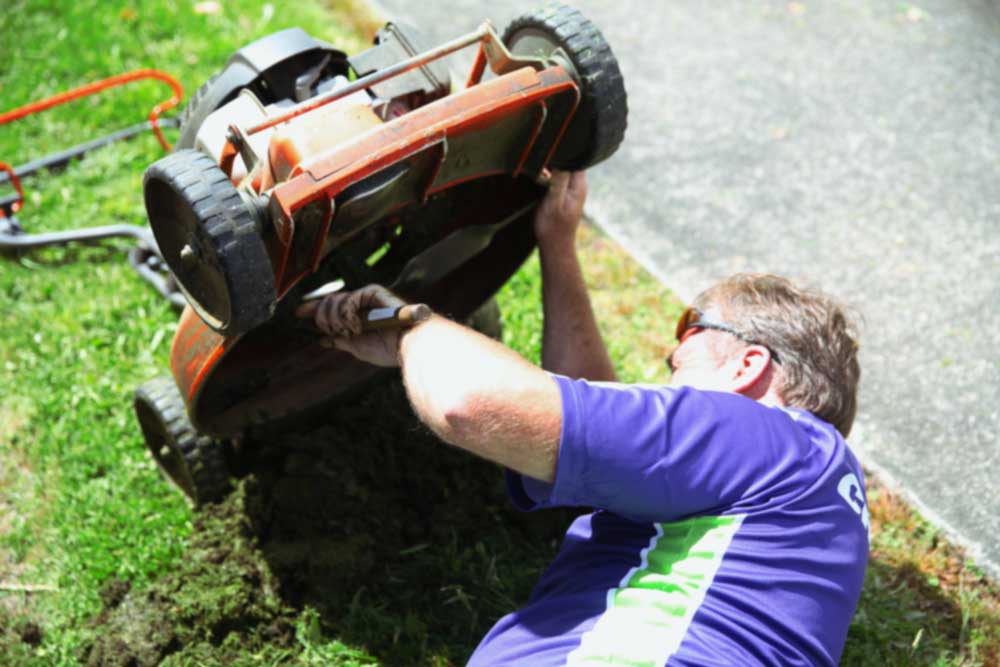By David Serville - founder of Crewcut lawn and garden
So you want the direct path to wealth and happiness in the lawn mowing industry ?
With 30 years now in this industry, I have seen almost everything on the subject of profitability for a residential lawn mowing business. While I mowed lawns predominately in Auckland (most of that within a lawn mowing franchise system), I have also mown lawns in many New Zealand cities and a couple in Australia. I have bought and sold hundreds of private and franchised lawn mowing businesses and advised many lawn mowing owners how to improve their businesses. These are the key habits and tricks to making better money than your competitors.
Most of these tips are either good tips to improve operational efficiencies or habits that need to be formed to improve profitability. They say it takes 21 days to form a habit. In my experience, it's failing to practice these simple habits that stop hard working lawn mowing franchisees and operators from realising the true potential of their businesses.
1. Start early, finish early
This is especially important for running a lawn mowing business in main urban centres to avoid traffic. The early bird catches the worm, so find the lawn suitable for early starts. Usually it's a commercial client that will not impact on late sleeping clients and neighbours. Finishing early means you have more time in the evening to get your admin sorted as well.
2. Sell excess lawns to develop a compact lawn mowing run
You don’t get paid for travelling between lawns. A little known fact is that your body tends to get stiff and cease up the longer you sit in your vehicle in-between jobs. The shorter the travel time, the easier it is to keep your momentum moving forward. At Crewcut we buy back excess lawns to facilitate less travel for our franchisees. This means you can really condense your patch of clients into one or two key areas and boost profitability.
3. Pricing for profit
This is a whole article in itself, but it's not hard to work out that not all lawns are as profitable as others. My advice - during spring, put the price up for the twenty percent of your 'less than profitable clients'. This will groom your clients annually to improve your profitability. If you do this in spring you will be less likely to lose clients.
4. Not all types of mowing are profitable
The main types of mowers you'll see are catch, mulch and side-deliver. In a perfect world we would side deliver, side throw (or a Crewcut mower) on all our lawns. These types of mowers are by far the fastest and easiest. Next is mulch mowing. It's both quick and very good for most lawns. So it's a great environmental solution. Catching is one of the slowest and even if you start charging more, it's always harder to recoup all your time and effort. The best catcher is a Reel Mower but this is really for the flat lawn that will be kept in the best shape. Again you will have to charge a premium. By encouraging your clients to mulch you will be both fast and environmentally friendly. Just remember that the client is always right, so do what they want, but it doesn't hurt to sell and promote mulching. In the end, it does grow a healthier grass, which is something all clients want.
5. Mow in the rain
Do a weather check each night and unless it's a flood or your lawns are far too soft to walk on, then commit to mowing in the rain. This is more about work ethic and motivation than anything else. But lawn mowing contractors that are unstoppable make more money. Customers like knowing that no matter what, you'll give 100% to their lawn despite the weather.
6. Have a strict payment policy and system
All Crewcut franchisees have a well developed client Terms of Trade form which is printed on the back of each client statement or invoice. Train your clients to pay monthly or every two lawn cuts. Cash flow is the life-blood of your business and good cash flow will mean that you never have to worry. Remember that planning customer payment methods is far easier than trying to claim their debts - it just gets too messy for what it's worth.
7. Mow early in the height of the season
Every week or 10 days, change clients from fortnightly to weekly for the growth season. Often they will agree for short periods of time. Not only does it increase your chances of profitability, but it will make your customers feel like your schedule is based on their lawn growth - one way to make them feel important!
8. Run your equipment like a Formula One pit crew team
At the end of each lawn mow, check your line trimmer cord and top up all machines with gas. Your flow and rhythm is essential to good, profitable days. It's also a good idea to check under your mower and clear out the clumped grass - it will help you mow a bit faster.
9. Walk fast all day
This might seem a bit of a basic tip, but lawn mower operators that make the most money always walk fast. Your profit is connected to your average speed.
Further Lawn Business Ownership Reading
10. Do not run extra staff in your own vehicle
This is unless you have a business designed to take them, and you have some experience in how to manage them. In a residential lawn mowing business, often two people in the same vehicle don’t make double the money, as you have to pay them while you're travelling from lawn to lawn. That said, it can be suitable if you use casual labour for gardening as these jobs are typically longer at one address.
11. Always own good quality, well maintained equipment
Do not hold onto old equipment as it's a false economy. Equipment, like anything else has a life. Budget for replacement. Depending on your maintenance and care, often equipment will need to be replaced every 18-24 months.
12. Set you van truck and or trailer up, well
This is about flow and process and making sure everything works well when it comes to access, storage and speed.
13. Wear good protective footwear
Unfortunately the jandals have to stay at home when you're mowing lawns. Make sure you wear comfortable AND protective footwear. Not only will they make you faster, the'll prevent any risk of injury from mowing over your foot or getting cut by the grass.
14. Pre-plan for the next day
Order your run at night for the next day and prepare equipment so you're ready to go! This might seem simple enough but it's one habit that will make you money every day. Generally when you first wake up it can take time to get your brain into second gear. If all you have to do is jump in your vehicle, look at the first lawn job and get mowing, this will mean your day will flow much better. Simple ways to prep your equipment include cleaning your gear and filling the mower and line trimmer with petrol.
15. Claim your petrol tax
You don’t pay for money on any petrol machines that aren't being used on the roads. This is free money and for a residential lawn mowing operator, this can amount to quite a bit of coin.
16. Have a back up plan for when things go wrong
Especially during the warmer months, your equipment and vehicle will be going gang busters. It's often the worst timing, but things can break down. Organise a supplier that will lend you loan equipment while they repair yours. Preparation for these events will minimise your down time.
17. Buy a Crewcut lawn mowing franchise
Many independents will read this and ask why. The simple fact is that we supply our franchisees with a steady flow of qualified leads. Which means we continuously attract people who want our mowing services and pass them on to our lawn mowing franchise owners. This is a huge advantage over a private business. Marketing takes experience and time which many lawn mowing independents don't have. So maybe they have bought a lawn run and it's all they need, but again how do they condense travel time and develop the business further? The selling back process and personalised marketing package each Crewcut franchisee gets insures that their business will always improve in profitability and revenue.
Finally along with the above, at Crewcut we live with a set of company values. By following them we always succeed, no matter what the situation is.
Be your word- We do what we promise
Create raving fans - We care about our clients happiness
Stick top the plan - We follow the Crewcut system to success
If you or someone else you know might be interested in a Crewcut lawn mowing business, be sure to contact us on 0800 800 286. Check out our list of available lawn mowing franchises for resale as there may be an opportunity in your neighbourhood.
Related Articles


























































